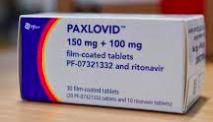
The White House just announced a "test to treat" program that is an excellent, but not perfect, way of dealing with future COVID infections. The program focuses on timely access to Pfizer's antiviral drug Paxlovid, something I have written about many times, most recently, here, here, and here.
As Professor Katherine Seley-Radtke and I wrote in the Baltimore Sun back in June 2020, "Vaccines might not be the only way to treat COVID-19." Indeed, this has proved to be the case. While the vaccines have helped keep COVID under control and greatly minimized both hospitalization and death, the emergence of deadlier and highly contagious variants, Delta and Omicron, respectively, changed the landscape of the infection from 2020-to 2021. The original vaccines were never designed to handle these variants. This is not anyone's fault; no one could have predicted Delta and Omicron. But these variants and (presumably) those that may emerge in the future can be handled very well by Paxlovid, which remains effective irrespective of the variant in question.
But like any other antiviral drug, the sooner it is administered, the better. Paxlovid is 90-100% effective in reducing deaths and hospitalizations when taken within five days of the start of symptoms. This raises a problem, something that Dr. Jeffrey Singer of the Cato Institute (and an ACSH advisor) and I discussed in a recent New York Daily News op-ed: the lack of an effective system to get the drug to sick patients in a rational and timely manner. The "test to treat" plan does just this.
How it works
- Availability of the drug is no longer a critical problem as it was months ago. And more than a million doses will be available this month and twice that in April.
- The administration will work with Pfizer to facilitate the delivery of the drug.
- "One-stop shopping" centers, where people can be tested, presumably with more accurate tests, and the pills given to anyone who tests positive.
- These centers will be located in pharmacies, supermarkets, and long-term care facilities.
- It should be possible for people who are infected to begin treatment within one day of diagnosis without jumping through any hoops.
But it's not perfect
For people who aren't taking prescription drugs, the plan is straightforward, but, as I wrote last month, Paxlovid consists of two different medicines: nirmatrelvir, the antiviral drug, and ritonavir, a "booster," which significantly decreases the metabolism of nirmatrelvir, permitting it to remain in the blood at higher levels and for longer. (See The Drug That Makes Paxlovid So Effective Can Also Make It Dangerous.) The ritonavir has the potential to cause serious problems for people who are taking certain prescription drugs such as statins (for high cholesterol), antiarrhythmics, blood thinners, sedatives, and at least two asthma drugs.
It is here where the program could face difficulties. To prevent dangerous drug-drug interactions, the dispensing pharmacist must have an accurate list of other drugs (and herbal supplements) being taken by every patient.
Bottom line
As variants have picked away at the efficacy of the vaccines, we are fortunate to have a treatment to add to the arsenal. The administration's plan to facilitate access to this treatment is very sound. All of us will benefit from fast, easy access to Paxlovid.



